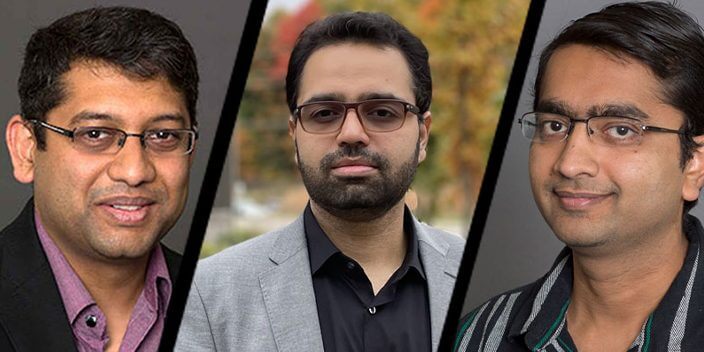Purdue receives $1.8 million from Department of Defense DEPSCoR grants

WEST LAFAYETTE, Ind. — Three Purdue University research teams that specialize in artificial intelligence and machine learning will share $1.8 million as recipients of the U.S. Defense Department’s Defense Established Program to Stimulate Competitive Research (DEPSCoR) awards, a program designed to bolster basic research initiatives at higher educational institutions.
All three selected Purdue projects engage with issues involving physical AI, an interdisciplinary field concerned with developing AI that intersects the virtual and physical worlds. Purdue leads efforts in this area through the Institute for Physical AI, a pillar of Purdue Computes, a strategic university initiative to further scale Purdue’s research and educational excellence.
Each team will receive up to $600,000 across a three-year period to pursue research that addresses DOD science and technology priority areas.
The three Purdue projects are among 25 chosen for the program:
- Reinforcement Learning for Adaptive Single Photon Imaging in the Sub-Rayleigh Region Through Atmospheric Turbulence — Vaneet Aggarwal, principal investigator and professor of industrial engineering. The objective of this project is to develop a quantum-inspired imaging system that captures single-photon light sources using machine learning techniques. This system will combine information-theoretic objective functions with neural networks to control and measure differences in overlapping light waves.
- Robust Stochastic Filtering for Shot Noise and Levy Noise Driven Systems — Harsha Honnappa, principal investigator and associate professor of industrial engineering. Stochastic filtering is a mathematical technique used to estimate the state of a system observed through a noisy sensor or measurement device. This project will develop rigorous theory and demonstrate novel methodology for computing stochastic filters of dynamical systems driven by processes that don’t follow predictable patterns.
- Compositional Learning From Imperfect Primitive Skill Sets for Solving Complex Tasks — Ahmed Qureshi, principal investigator and assistant professor of computer science. This project aims to develop a robot learning paradigm that can automatically learn missing skills and combine them with existing skills to solve complex robot navigation tasks. This advancement will allow robots to perform new tasks despite having incomplete skills and reuse them to improve their abilities.
The DEPSCoR program introduces tenured and tenure-track professors to the defense ecosystem and its unique research needs. In addition to funding support, principal investigators from each collaborative team receive mentorship from a researcher who has experience working with the DOD.
The purpose of DEPSCoR is “to increase the number of academics pursuing research in DOD-relevant areas, while enhancing the science and engineering capacity of their institutions into the long term,” said Bindu Nair, director of DOD’s Basic Research Office. “It is crucial that we build a Department of Defense research infrastructure that strategically uses the research capabilities found across the country.”
Funding opportunities for the FY24 DEPSCoR Research Collaboration and FY24 DEPSCoR Capacity Building are now available on grants.gov.
About Purdue University
Purdue University is a public research institution demonstrating excellence at scale. Ranked among top 10 public universities and with two colleges in the top four in the United States, Purdue discovers and disseminates knowledge with a quality and at a scale second to none. More than 105,000 students study at Purdue across modalities and locations, including nearly 50,000 in person on the West Lafayette campus. Committed to affordability and accessibility, Purdue’s main campus has frozen tuition 13 years in a row. See how Purdue never stops in the persistent pursuit of the next giant leap — including its first comprehensive urban campus in Indianapolis, the new Mitchell E. Daniels, Jr. School of Business, and Purdue Computes — at https://www.purdue.edu/president/strategic-initiatives.
Writer/Media contact: Lindsey Macdonald
Sources: Vaneet Aggarwal, vaneet@purdue.edu
Harsha Honnappa, honnappa@purdue.edu
Ahmed Qureshi, qureshi7@purdue.edu